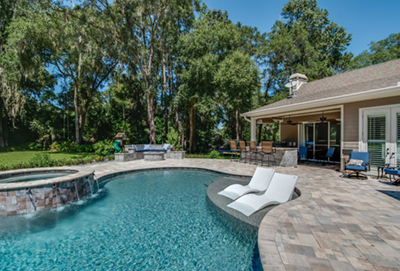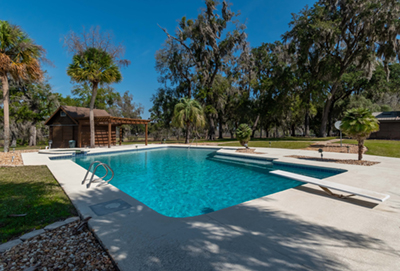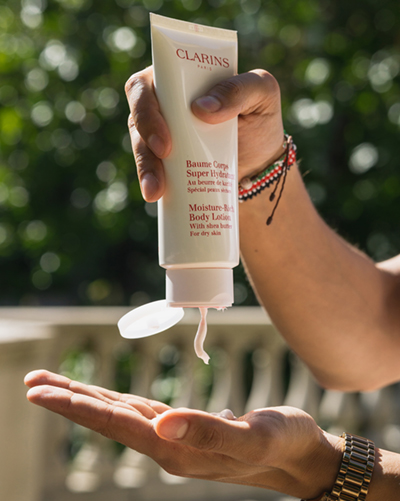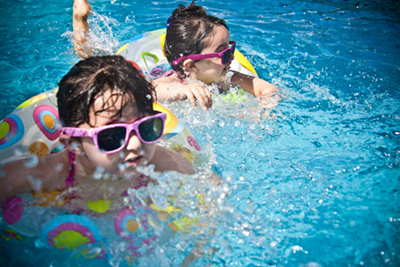
The solace of a sparkling pool can combat utter stupefaction of the season – not to mention heat stroke, which is a real concern especially for children – and part of the fun is keeping it a safe retreat everyone can enjoy. It’s important to know and maintain some basic safety practices to protect everyone’s well-being and health, so your afternoon dips are worry-free.
Drains

Drain suction is strong; it has to be in order to efficiently filter and clean detritus and impurities from the water. It’s also strong enough to grab jewelry, hair, swimsuits – all of that can get pulled in and trap a swimmer under the surface. Most adults can break away and escape relatively unscathed, but small children are more vulnerable.
It’s a good idea to make a list of safety rules prohibiting jewelry and other items in the pool, and be sure everyone understands them. Teach kids how the drains work and why they need to keep away from them while swimming, and never leave children unattended in the pool area. You’ll also want to clean them regularly to keep them clear of clogs and other obstructions. There are also some extremely affordable options for drain and pool covers available that will add an extra layer of safety.
Lastly, keep a pair of scissors where someone can get to them quickly, just in case you need to snip your swim trunks off and swim to safety. You might be a little embarrassed, but it’s better than the alternative.
Maintenance

Testing the water quality is essential for many reasons; if the right pH levels aren’t maintained, that can cause a lot of problems or at worst, serious injuries. Chlorine kills bacteria – so it’s our friend – but it’s also that temperamental friend that can have mood swings. If there’s not enough, you can end up with swamp creatures. If there’s too much, swimmers can suffer chemical burns, earaches, irritations, or become seriously ill. Learn how to measure and maintain the proper, safe PH level and how to recognize when there’s a problem or imbalance in the chemicals. Sometimes the wrong mix can also create a fire hazard, believe it or not – so it’s really crucial to be digilent checking the water regularly. Keep your chemicals in a safe, secure place away from where children and pets could possibly access and consume them.
First Aid

With all the fun of cavorting in the pool comes the occasional bump or scrape, so it’s always a good idea to have a First Aid kit stocked with necessaries like bandages, calamine lotion, sunscreen, antiseptic wipes, and antibiotic ointment, plus a tutorial for everyone so they know what to use and why. You might also consider enrolling your family in CPR and First Aid classes, which can be an empowering and lifesaving action; knowing how to handle an emergency makes everyone that much safer, and it’s knowledge they’ll have for life.
If you have small children, consider teaching them how to call for emergency services and the information to give over the phone. Make sure they know the address and a secondary phone number, and who else to call or find for help in case they need it.
Water Safety

One of the best ways to keep kids safe in the water is pretty simple: learning how to swim. Teaching them water buoyancy and floating, treading and holding breath under water, and instructing them about basic swimming strokes can build their confidence and lessen anxieties they might have about being around water. Swimming lessons in a group class allows them to learn with kids their own age – plus the exercise is beneficial for their hearts, lungs, endurance, muscles, and overall health – not to mention their social skills. The Ocala YMCA offers lessons for all ages, and the FAST Falcons also have a fantastic program available for students pre-K and up. You can also find a list of aquatic centers.
Another security protection you can add is fencing your pool area; the average cost, depending on the type you want, can range from $1500 up to $10,000. If you have young toddlers, it’s no surprise how fast they move. One minute you’re looking at them eating Cheerios in front of the television, and two minutes later they’ve created a Picasso on the second-floor wall. Each year, 500 kids under age 5 drown in private swimming pools. Installing a fence with a latched, locked gate can help prevent a totally preventable tragedy. You can also find motion sensor, camera and alarm systems that are relatively inexpensive at pool stores, Walmart and Home Depot.
You can check out our related feature column in Gainesville City Lifestyle, and have a look at some of the fantastic articles celebrating summer in Gainesville and Central Florida!
https://citylifestyle.com/palm-coast-fl/articles/home-and-design/summer-spash-and-safety